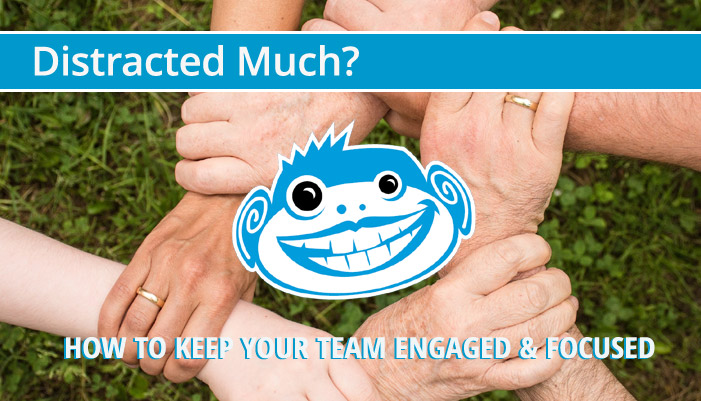Happy Fourth of July, everyone!
By now you’ve probably got plans for the weekend—maybe the beach, a cook out, a hike in the mountains, or some kind of get-together with family and friends before you top it all off with a fireworks extravaganza. Also by now, you and your employees are probably thinking more about Friday and the long weekend than you are about what’s left of the work week.
As a manager or small business owner, you’ve probably seen and experienced this kind of distraction countless times whenever there’s a big holiday approaching such as the Fourth, Memorial Day, Thanksgiving, Christmas, etc. At times like these, how do you keep your team engaged and focused on the task at hand?
Consider these team building and team effectiveness tips, and how you can apply them to your own situation:
Everyone Needs Skin in the Game
Sure, all of your employees, independent contractors, and suppliers have skin in the game, if for no other reason than they want to remain gainfully employed or connected to your business. But the days of the “do your job or you’re out” management style are long gone. Team performance is not bolstered by wielding a big stick. Team members need to understand their roles, how what they do affects other team members, and how they contribute to the big picture (i.e. the company’s bottom line). They also need to know that if the company does well, they’ll do well too—not only in the form of a regular paycheck and job security, but in the form of being recognized for their contributions, either through words of praise or other perks such as extra time off or financial rewards.
Lead by Example
What message does it send to your team if you’re always bugging out before a holiday, stretching what’s already a 3-day long weekend into something akin to a mini vacation. Sure, you’re the boss and all that, and you work hard, but modeling the kind of behavior you want to see in your staff goes a long way to boosting team cohesiveness and effectiveness.
No Man (Or Woman) Left Behind
If you’re truly a team, then you need to act like one. No individual should be doing the lion’s share of the work, slogging through long hours, staying late on nights and weekends, while his or her teammates enjoy a lighter load. Extra hours are unavoidable, especially when deadlines loom—but there’s an old saying that’s worth repeating: “Many hands make light work.” Many hands also build team collaboration and boost morale.
Let Others Take the Reins
You may be the boss, the one in charge, but you can’t always take the lead. People get more invested in outcomes when they’re responsible and accountable for the results. Presumably, your team represents a group with diverse skills, talents, and strengths. Let members of your team take ownership of particular areas as appropriate. They’ll feel good about themselves, become more engaged, you’ll get to focus on the bigger picture, and you’ll be helping to grow the leadership and management skills of your people.
Offer Real-Time Feedback
The time to recognize someone for a job well done, or going above and beyond by staying late, or simply exceeding your expectations is when it happens—not 3, 4, 5, or more months down the road when it’s time for the person’s annual review. By then, the moment will have passed and it’s quite possible the employee may harbor some resentment because that person knows he or she did well, yet you said/did nothing. So say something, or write a quick email or thank you note. The few seconds you spend doing so will be well worth it. And even if the feedback is not positive, there’s still no time like the present. Knowing something didn’t go well or wasn’t done right will help the person learn and avoid repeating the same mistake.
Teams Can’t Always Be All Work, No Play
Whenever I hear the word “team,” my first thoughts naturally relate to sports teams, like baseball or football teams. It’s an inevitable word association. The next association I have is with “play,” which I also find quite appropriate. Teams play, they have fun, even business teams. The best teams work hard and they make time to play together, too—simple things like grabbing a beer after work, going for sandwiches at lunch, or enjoying a team bowling night. Granted, not everyone on every team will be best buddies, but being able to socialize absent the pressures of work and deadlines is good for the body, mind, and spirit.
Whether you’re a Mom and Pop operation or a Fortune 500 organization, building a strong, cohesive team is a requisite for success in today’s marketplace. Strong teams know their roles, communicate well, and get the job done. They also tend to be more flexible, innovative, and they know how to have fun.
How do you foster team effectiveness at your organization? What team building, team engagement tips do you have to share with Monkeyz readers?
In the meantime, learn more team building tips from Barrel O’Monkeyz with these past blogs, “Tips to Make Your Team Thrive,” “The Three ‘P’s of Teamwork: People, Processes, and Place,” and “Does Your Team Make the Grade?” Enjoy!
Paul June is King Monkey of BARREL O’MONKEYZ, a San Diego-based strategic marketing agency specializing in Sports and Active Lifestyle markets. We serve as a seasoned, outsourced marketing team for companies looking to ramp up sales and launch new products. Our barrel is full of talent and creative arms ready to prove we don’t just monkey around!

